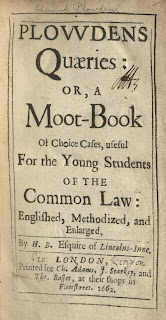The Law Library is pleased to announce two new exhibits open in the Riesenfeld Rare Books Research Center:
"Tools of the Profession: Law Books and the History of Legal Education"
and
"Law Books in Legal Education at Minnesota"
The history of legal education is known above all through the literature of the law. Imbued by the spirit of practice, the training necessary to help students become successful attorneys has for centuries depended on a diversity of texts. From statute books to casebooks, and from famous treatises to dictionaries, legal literature has developed not only to record the law and aid professionals in practice, but to guide students from their earliest studies.
In England, students played a role in copying and distributing early collections of pleadings and writs, and keenly studied and annotated case law. Early treatises were based partly on class lectures. Lawyers, particularly from the early modern period onward, authored additional tools aimed at students, from exam prep guides to advice books. In the age of print, an expanding publishing market produced summaries and epitomes of the law for self-directed education.
In nineteenth-century America, professionals created a new literature, distinguished from its English origins, intended for young students as much as practitioners. Even the famed “revolution” in American legal education, still with us today, is first seen in a law book: Christopher Columbus Langdell’s 1871 casebook on contracts imposed an innovative method of instruction on the faculty and students who used it.
An accompanying exhibit, “Law Books in Legal Education at Minnesota,” showcases literature that has trained Law School students from the earliest days of our institution. Based in the Law School’s rich archives, the exhibit centers around historical coursebooks, lectures, exam prep material, student notebooks, and exams, casting light on legal education at Minnesota. Selections from the Law School’s growing student notebook collection, in particular, reveal how students engaged with the law and a dynamic education.
“Tools of the Profession: Law Books and the History of Legal Education,” and “Law Books in Legal Education at Minnesota,” invites visitors to peruse the history of legal education through a diverse literature that reveals its contours.
The exhibits were curated by Ryan Greenwood, Pat Graybill and Lily Eisenthal. For more information or to arrange a tour, please contact Ryan Greenwood (rgreenwo@umn.edu; 612-625-7323).










